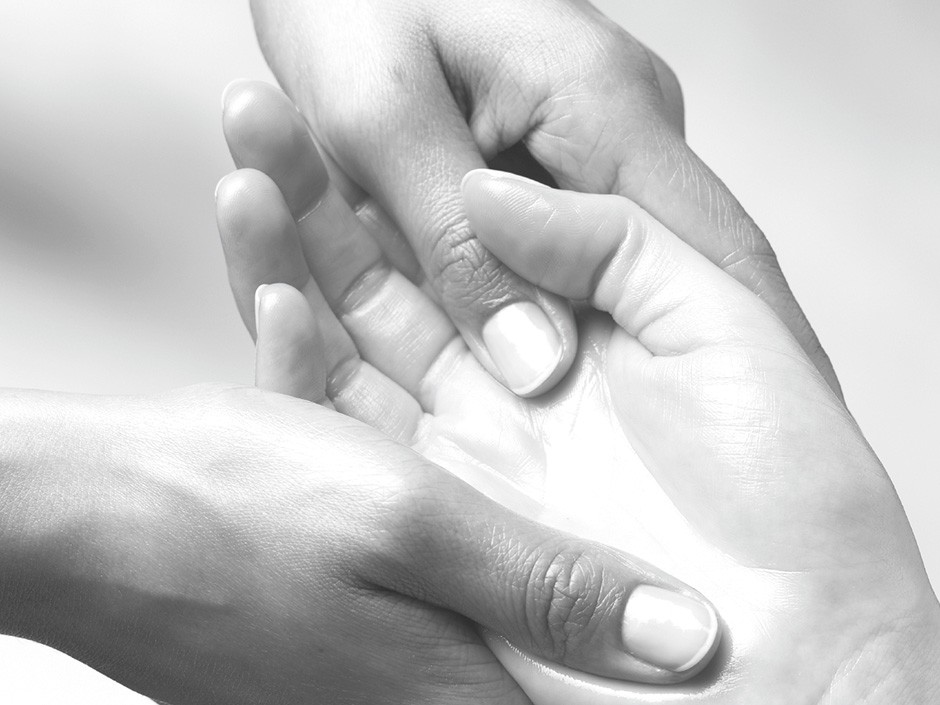When I was a boy, I went down to the creek bed in the big, empty high plains of Montana, in search of things. My grandmother, a delightful and ever-open person, taught me to search, and when I went to the creek bed, I found water snakes skating on the water’s surface in flashes of green and yellow lightning. When I lifted them from the flow, they curled their slender bodies around my wrist like sun-kissed bracelets. That search for meaningful things and the possibilities that exist in the world has stayed with me all my life. It led me to try to understand more about people: what keeps us together, what tears us apart. I became a researcher and began to study leadership and forgiveness, especially the moment when we touch someone in the attempt to forgive, or when we are touched by another and feel forgiven. Not surprisingly, touch and forgiveness inform each other in eloquent and sonorous ways, and I’ve found in this search a certain unity that I believe to be among the great gifts to humanity.
In my experience, most people hope for healing, but the road sometimes involves so much vulnerability that people veer away.
When a man, for example, seeks forgiveness and atonement from his own son, the quest is impossible if that father has not humbled himself. The real family work a father goes through results in what Ignatius called “peace of soul,” a well-lived life that contains meaningful touch; an articulated sense of emotional, verbal and physical healing; justice and mercy in the aftermath of harm; and a holistic embrace of the feminine and the masculine.
Openness is crucial. When someone becomes transparent, sincerely asks forgiveness or offers forgiveness, and chooses the long journey to atonement, grace ensues. As a writer, touch and forgiveness inform the words and actions that flow into and out of my life and the life of my family. I think of my own daughters’ hands, and I think of the hands of others. Hands in all shades and sizes, all ages and states of loveliness or disrepair. The hand is a symbol of our shared humanity toward one another: the hand of violence, the hand of tenderness, the hand on which a finger is broken or cut off, the hand that is young and new to the world, the old, weather-worn hand. The hand that has been amputated. Hands are vessels of despair or forgiveness. Even when we are bound by fear, our humanity calls out to one another. I’ve witnessed the love that occurs between us as women and men, as people of diverse races and such varied preferences in faith, socioeconomic level, sexuality and personhood. Sacredness exists below the fear, if we can cross the threshold, open the veil and walk in.
Legitimate or true leadership is elusive, filled with nuances of love and power that are uncommon and require uncommon foresight, discernment, contemplation and action. Forgiveness too is highly nuanced, and in fact involves a refreshingly disciplined process, a process that can be given voice and made known. Forgiveness brings to mind current developments in philosophy, psychology, theology and political science: the idea that there is ultimate violence in the world, and yet we find a dormant intimacy below this violence, a power intimately associated with ultimate forgiveness. Again, the level of ultimate violence the world presently faces is tantamount to a collective epidemic of annihilation: 5 million war-related deaths three centuries ago, 20 million two centuries ago, and a staggering 110 million war-related deaths in the past century. Add government-imposed genocides and famines and the number reaches a staggering 180 million.
We know ultimate evil exists. What is less reported or given less narrative voice is ultimate good, ultimate intimacy, and ultimate reconciliation. This is where personal and collective leadership becomes so important. In current social science research, people with higher forgiveness capacity have significantly less depression and anxiety, greater emotional well-being, and in an amazing symbol of our shared humanity, significantly less heart disease. So in philosophy and theology, as well as psychology and political theory, one of the things that fascinates me is the idea that ultimate forgiveness is now being revealed as the systemic and biological counter to the ultimate violence that exists in the world.
The path from war to peace is arduous and hard-won. Beyond fear is love.
Shann Ray is a professor of Leadership Studies at Gonzaga University. He is the author of Forgiveness and Power in the Age of Atrocity: Servant Leadership as a Way of Life; American Masculine: Stories; and Balefire: Poems, forthcoming from Lost Horse Press.

















